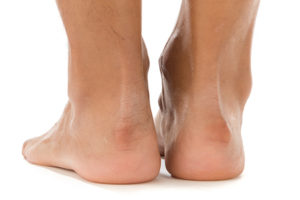
For people with coronary artery disease, the thickness of the Achilles tendon may be an indicator of the severity of their disease and how likely they are to have a heart attack, new research suggests.
Our Take
People should know that the routine measurement of Achilles tendon thickness is not currently recommended to screen for coronary artery disease. The association of tendon thickness and coronary artery disease requires more research, but is unlikely to replace current screening methods.
Note that regularly scheduled routine physical examinations by your primary care physician with established screening tools are important for the diagnosis and prevention of coronary artery disease.
Increased Achilles tendon thickening is an orthopedic problem, however, noted Garett Pangrazzi, MD, a foot and ankle specialist with Spectrum Health Medical Group.
It can be associated with overuse, blood supply problems, age, obesity, high cholesterol, diabetes, medication side effects and abnormal foot anatomy.“Pain may or may not be present, but as an orthopedic surgeon, I typically see patients when pain begins,” Dr. Pangrazzi said. “Patients are usually in their mid-40s or older when symptoms begin.”
Ways to prevent Achilles tendinosis include maintaining a healthy body weight, avoiding a sedentary lifestyle and performing daily stretching exercises of your calf muscle, Dr. Pangrazzi said.
“Treatment is primarily nonsurgical, with physical therapy focusing on eccentric strengthening of the calf being extremely important for recovery,” he said. “Surgery is required in a minority of patients who do not improve with nonsurgical treatment.”
The Achilles tendon—the longest and strongest tendon in the body—connects the calf muscles to the heel bone. The study, presented recently at the American Heart Association’s Scientific Sessions meeting in Chicago, looked at the association between severity of coronary artery disease and thickness of the Achilles tendon in 241 people who had received a stent to open a blocked blood vessel in their heart.
The researchers identified participants with an Achilles tendon thickness of 9 millimeters—about a third of an inch—or more. About 80 percent of those patients had more than one heart artery that was blocked, placing them at higher risk for a heart attack. Among those with a thinner Achilles tendon, 58 percent had more than one blocked heart artery.
People with a thick Achilles tendon also were more likely to have left main coronary artery disease, which is associated with the highest risk of heart disease and death.
The study’s lead author, Dr. Takuya Hashimoto, a cardiologist at the Kitasato University School of Medicine in Tokyo, said that a diagnosis of Achilles tendon thickness could potentially be used to identify people at risk of heart disease.
But he said this study couldn’t confirm that because it included patients already with coronary artery disease and did not look at patients with Achilles tendon thickening due to other causes.
Another study presented at the conference looked at the best way to diagnose familial hypercholesterolemia, or FH, by measuring Achilles tendon thickness.
FH is an inherited disorder that causes dangerously high cholesterol levels. Achilles tendon lumps caused by cholesterol deposits, known as xanthomas, are a known indicator of coronary artery disease in people with FH.
X-rays are generally used, but the new study found that ultrasound imaging may be better at detecting the genetic condition among people who needed a heart stent.
Dr. Philip Ades, a cardiologist at the University of Vermont College of Medicine who was not involved with either study, said the research addresses an association that has intrigued heart doctors for years.
“As a clinician, if I see a patient with a very thickened Achilles tendon or xanthomas, I’ll tell myself, ‘If they’re depositing cholesterol in their tendons, it’s very likely they’re depositing lipids elsewhere, such as in their coronary arteries,'” he said.
But given that there already are numerous ways to predict which patients are more likely to develop coronary artery disease, Ades said he doesn’t see screening for Achilles tendon thickness as something likely to become routine.
“Sending people to the hospital for a fancy X-ray of their Achilles isn’t warranted when we already have these simple measures to tell us who is more likely to have coronary disease,” he said.

 /a>
/a>
 /a>
/a>
 /a>
/a>